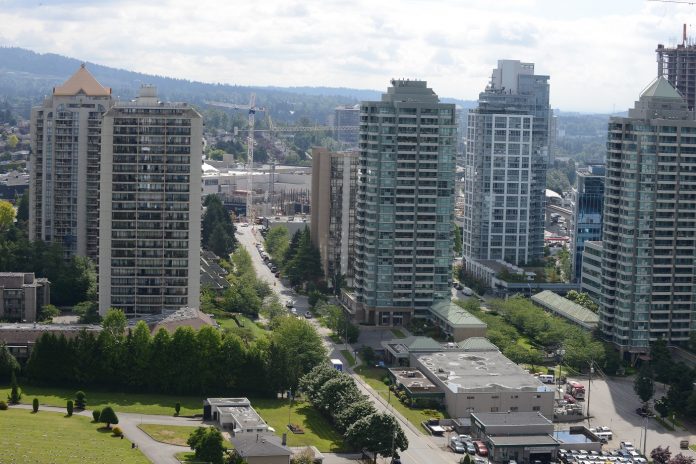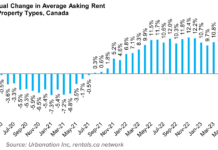B.C. maintained its position as the most expensive province; Vancouver remained Canada’s most expensive city
AVERAGE asking rent for all property types increased by 10% annually to $2,196, reaching another record high in January 2024, according to Rentals.ca and Urbanation’s latest National Rent Report.
This increase reflects a 0.8% month-over-month rise, pushing the annual rate of rent growth to a four-month high. Compared to January 2020, before the onset of COVID-19 lockdowns, average asking rents have increased 20%, translating to a $373 per month increase.
“The Canadian rental market began 2024 where it left off in 2023, with rents surging to new highs,” said Shaun Hildebrand, President of Urbanation, on Wednesday. “However, an underlying narrative has emerged between softening rents in expensive markets and strengthening rents in more affordable markets. These shifts in demand are symptomatic of a worsening supply situation for rentals in Canada.”
Among different property types, purpose-built rental apartments witnessed the most substantial growth, with average asking rents increasing by 13.5% over the past year to $2,107. Condominium rentals followed, experiencing a 4.1% annual increase to average rents of $2,372 in January. Meanwhile, house rentals saw a 5.6% year-over-year increase, reaching an average of $2,352.
One-bedroom apartment rents saw an increase of 12.6% annually, reaching a record average of $2,146. Similarly, two-bedroom apartments saw an 11.0% surge in asking rents to an average of $2,334, while three-bedroom rents averaged $2,638, marking an 11.6% increase from the previous year. Studio apartments also experienced strong growth, with rents rising by 11.8% annually to reach an average of $1,595.
Regional disparities in rent growth were evident, with Nova Scotia, Alberta, and Saskatchewan leading with annual rent inflation rates of 19.1%, 17.8%, and 17.5% respectively. British Columbia maintained its position as the most expensive province, with average asking rents reaching $2,529 for purpose-built and condominium apartments in January, albeit with a slower annual growth rate of 2.3%.
In Canada’s largest cities, Edmonton surpassed Calgary in rent inflation, posting a 17.1% annual increase to an average of $1,479 for purpose-built and condominium rentals. Vancouver remained Canada’s most expensive city, despite a 3% decrease in rents from the previous year, with an average asking rent of $3,055. Toronto saw a modest 2.4% increase in rents over the past year, reaching $2,830 on average.
Roommate rents across Canada hit a record high of over $1,000, with average asking rents for shared accommodations increasing by 18.5% annually to $1,010 in January. Vancouver and Toronto recorded the highest roommate rents at $1,338 and $1,311 respectively.
The National Rent Report charts and analyzes monthly, quarterly and annual rates and trends in the rental market on national, provincial, and municipal levels across all listings on the Rentals.ca Network for Canada. The data from the digital rental platform Rentfaster.ca is incorporated into this report.
Rentals.ca Network data is analyzed and the report is written by Urbanation, a Toronto-based real estate research firm providing in-depth market analysis and consulting services since 1981.
*The data includes single-detached homes, semi-detached homes, townhouses, condominium apartments, rental apartments and basement apartments (outlier listings are removed, as are single-room rentals.)













